Youth in Vocational Education: Five skills at Once
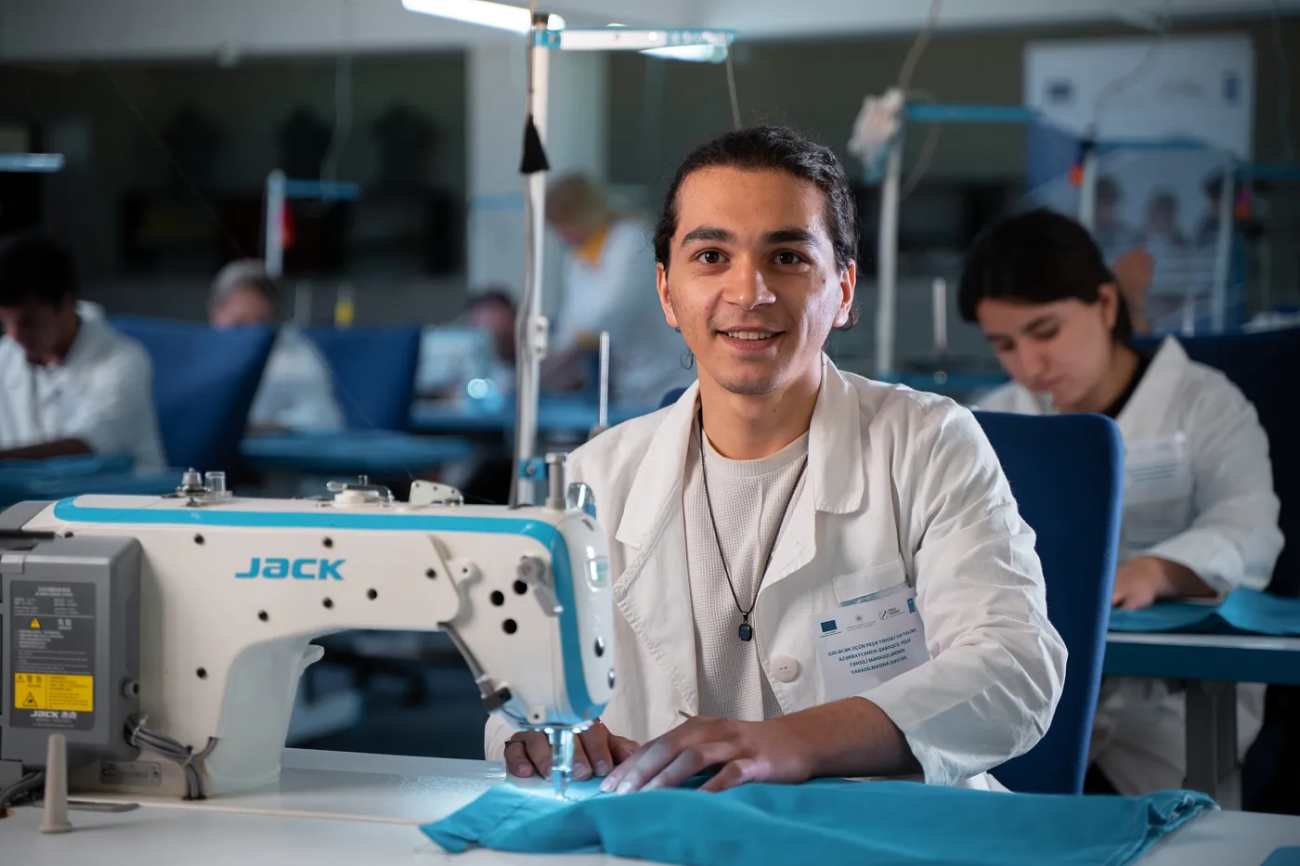
18-year-old Ozjan Ibrahimov is simultaneously a talented tailor, a teacher’s assistant, a young man who makes money from his favorite profession, a self-taught writer and a successful graduate. How did Ozjan master these different skills? Let’s take a look at the past recent year and get to know how Ozjan succeeded to wear many hats.
Ozjan studies at the Ganja State Vocational Education Center on Industry and Technologies, closely assists teachers in giving lessons on inclusive courses and herewith, works after school.
After graduating from the 9th grade of upper secondary school, Ozjan decides to apply for vocational education. He has finished his 3-year tailoring faculty. “I can say that this vocation chose me rather than I chose it. Actually, I applied to study cooking but was admitted to tailoring. I don’t regret it, on the contrary, it is great. Currently, I work as a dress cutter in one of the city’s prestigious clothing stores.
This vocational education center is one of the vocational education and training institutions benefiting from the “VET for the Future” project funded by the European Union (EU) and implemented by the United Nations Development Programme (UNDP) together with the State Agency on Vocational Education (SAVE). The project collaborates with 8 different vocational education institutions in Baku, Ganja, Jalilabad, and Shaki. The project aims to support the modernisation of vocational education and training (VET) providers in Azerbaijan and increase the labour market relevance of vocational education.
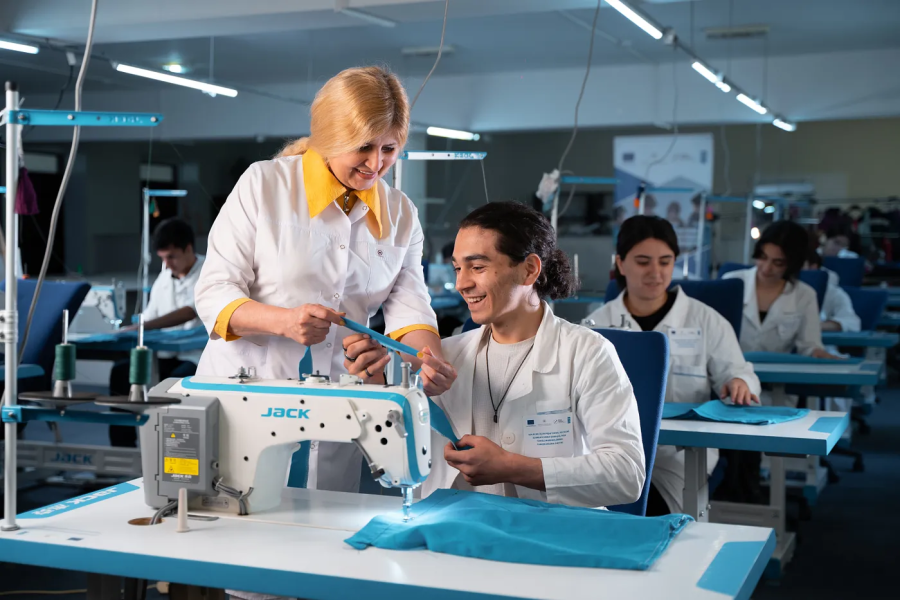
Ozjan is one of the hundreds of students who have benefited from the new opportunities provided by that project and is quite satisfied with his current specialty. “If we crack our eyes open and look around, we will see a lot of our young people wasting the best treasure they have which is time. Based on my experience, I can tell my peers that everyone should do the work they love. There is a wonderful educational institution for this, and they must consciously benefit from this opportunity.”
It was no coincidence that in 2019, the tailor workshop meeting the latest international standards was established with the support of an earlier vocational project funded by the EU and jointly implemented by UNDP and SAVE.
To continue this activity, as part of the current project, teaching resources were updated, and according training series were arranged for the teaching staff. As a result of the increasing demand and interest in tailoring there is already an opportunity to study “Fashion Design” faculty at a high VET level. Students can also use the career services created by the project.
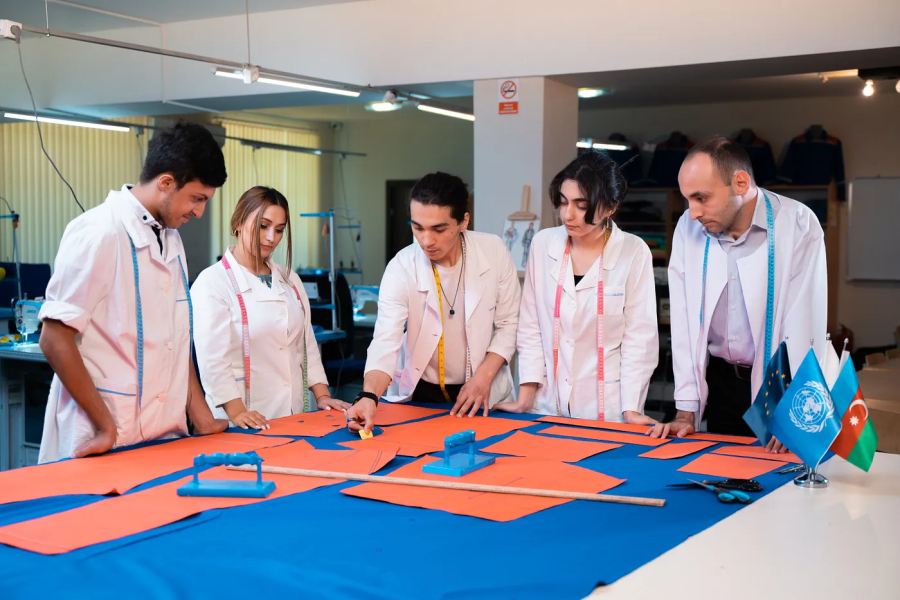
Preparedness for future’s changing challenges and mastering new skills take a significant place on today’s global development agenda. The 8th and 10th of the Sustainable Development Goals focus, respectively, on decent work and reducing inequalities. To achieve these goals, special emphasis is placed on education and skill development. In this sense, vocational education helps to increase the employment opportunities of young people by facilitating access to various trainings. Also, through its teaching form, VET can contribute to the development of competent professionals in a short time while contributing to a sustainable economy and a better future in general.
In this light, taking you back how Ozjan continued his journey. Along with graduating from the short-term inclusive tailoring course arranged by the Project, Ozjan also joined the newly opened courses, but this time as not a student but a teacher’s assistant. “On inclusive courses, I assist our teachers” A total of 33 persons studied tailoring here, including 8 students with disabilities. Along with this specialty, a total of 90 people benefited from the hairdresser and computer operator courses. In Ganja, 66 students have successfully completed the course and 18 people with disabilities (PwD) are among these successful graduates.
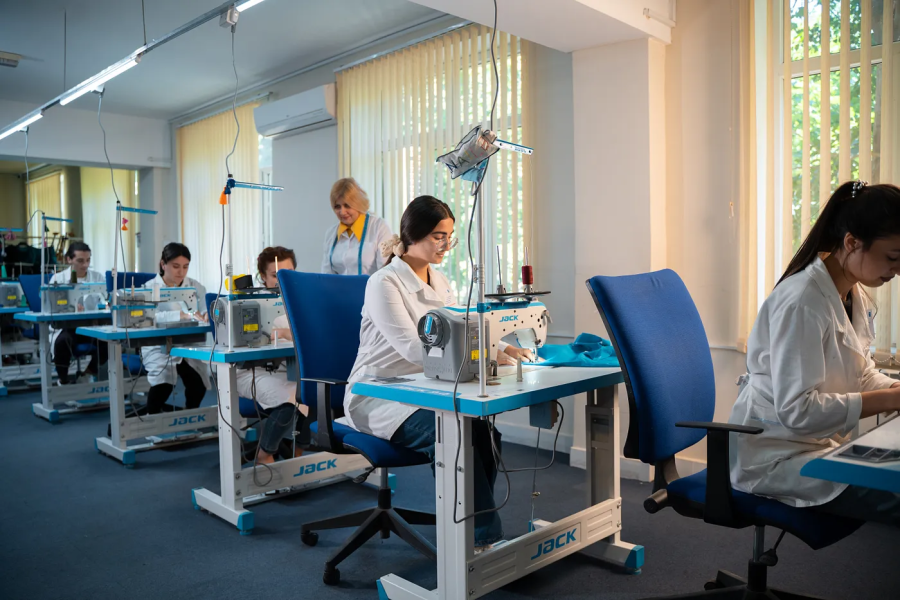
With the EU’s financial support, the project organised inclusive VET courses in 3 vocational education institutions located not only in Ganja, but also the capital Baku. The courses were arranged in 10 different vocations, including computer operator, social media management, SQL (programming language), floristry, pottery, stained glass, tailoring, hairdresser, confectionery, and chef. Participation in the courses was carried out through certain selection stages. Also, a pre-upskilling programme was organised for the instructors who will teach in these courses in order to increase their knowledge and skills on inclusive education. 60 specialists across the country, including teachers, training masters, and assisting personnel have improved their educational methods suitable for students with special needs.
The courses were attended by people aged from 15 up to 62. As a result, a total of 400 people, including 94 PwD (people with disabilities) benefited from the short-term courses. Thanks to the skills gained from the courses, 46 people started new jobs. Taking into account the successful results and demand, the project will support the opening of the next inclusive group.
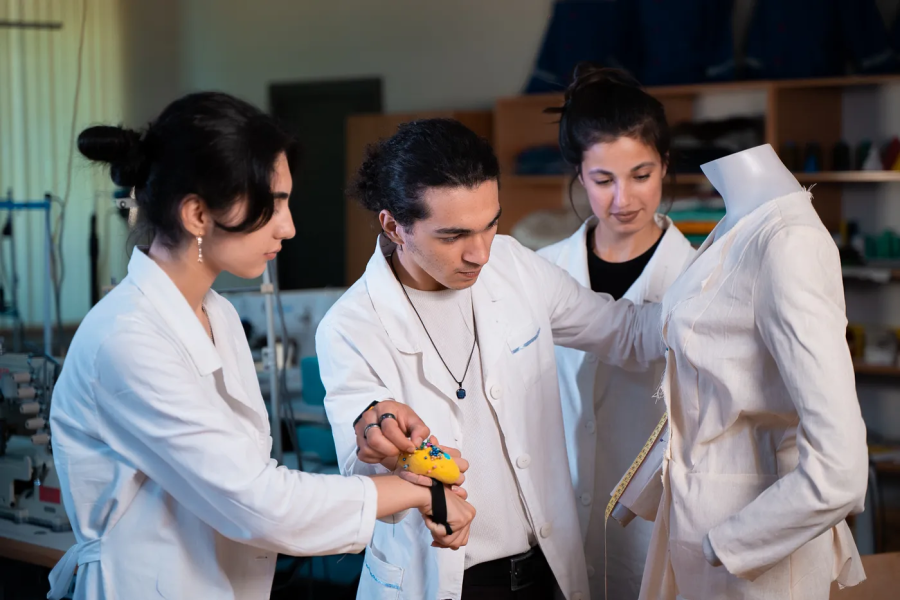
Proudly talking about his specialty, Ozjan shares the cause for his interest in this work: “I like to create a new style, a new design, and the best aspect of this art is that everything depends on you, you can create whatever you want,” he stresses. He states his wish to bring completely unusual styles to Azerbaijan, create alternative designs, and present them to the people: “it’s wonderful when people like the clothes you create, isn’t it?”
“My further plans are a bit vague since I am also a writer. I have written 2 novel volumes, and my further plans include both becoming a writer and a tailor, creating new lines and a different style… Currently, I am studying, working, and earning money” (he proudly notes).
In fact, both plans are based on the desire to create. Those who are or want to be creative, or who want to express themselves freely choose vocational education. Ozjan believes that he can make himself and other people happy by creating new things.
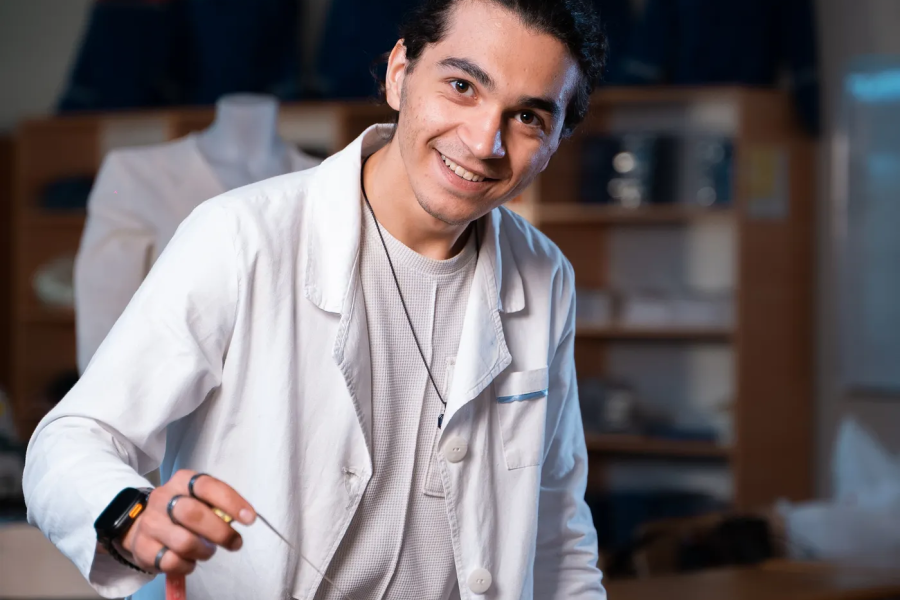
He also tried other ways to make people happy. On this point, Ozjan candidly supported his fellow students with limited health conditions and encouraged them to choose VET and continue in their work. One of them is Ahmad.
“We were informed that there is such an opportunity in this enterprise, so we came and got interested. Actually, I didn’t want to come to the class at first, but then the course participants, specially Ozjan, supported me and after seeing the environment here, I liked it. Everyone helps each other here. I joined the classes 3 times a week for 2 months” says Ahmad. “After finishing the 9th grade, I also received 2 years of vocational education in auto plumbing, though I have been familiar with sewing since I was a child. Sewing calms a person, I enjoy it. I would like to mention that the new equipment provided in this workshop also encouraged me to work in this area. Everything here is just modern and new”.
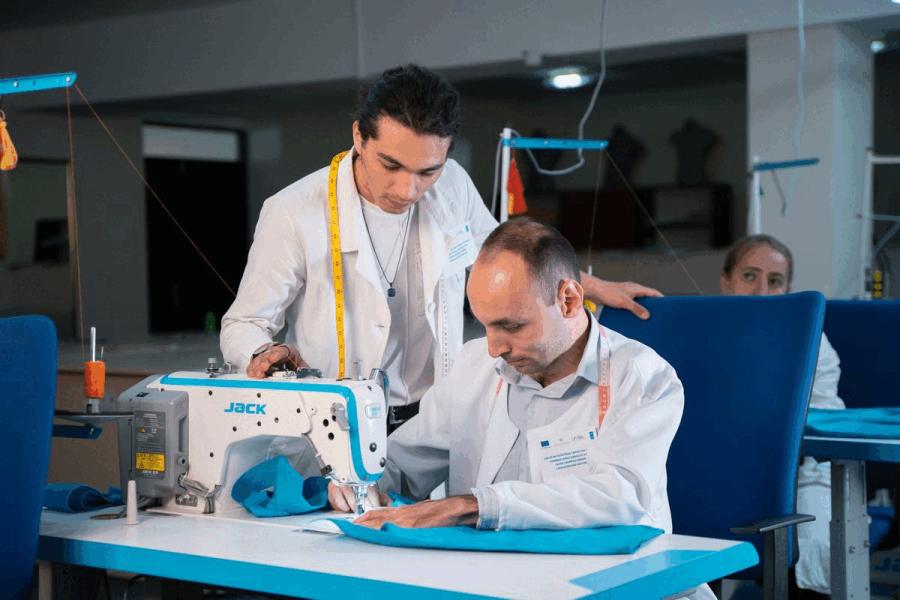
Ahmad, who is now 30 years old, plans to level up his skills in this vocation and work as a tailor. “People should not shy away, regardless of whether there are more women or men in any vocation, they should come to VET, they will like it,” he concludes his conversation with the piece of advice.
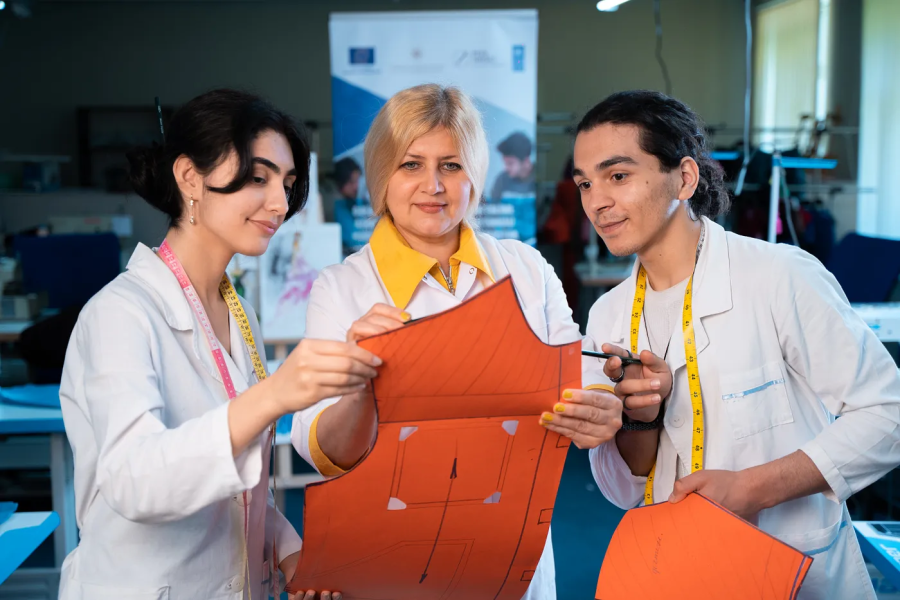
Raviyya Aliyeva sharing the same educational path as Ozjan was also enrolled to the same vocational education center after completing the 9th grade of school. She also successfully completed the short-term courses here.
Being this year’s graduate herself, Raviyya notes that her relatives recommended this specialty to her, but she was also interested in it from the very beginning. “I like to design clothes using my imagination,” Raviyya says. Like her colleague Ozjan, she assists in teaching of the mentioned courses attended by students with all abilities.
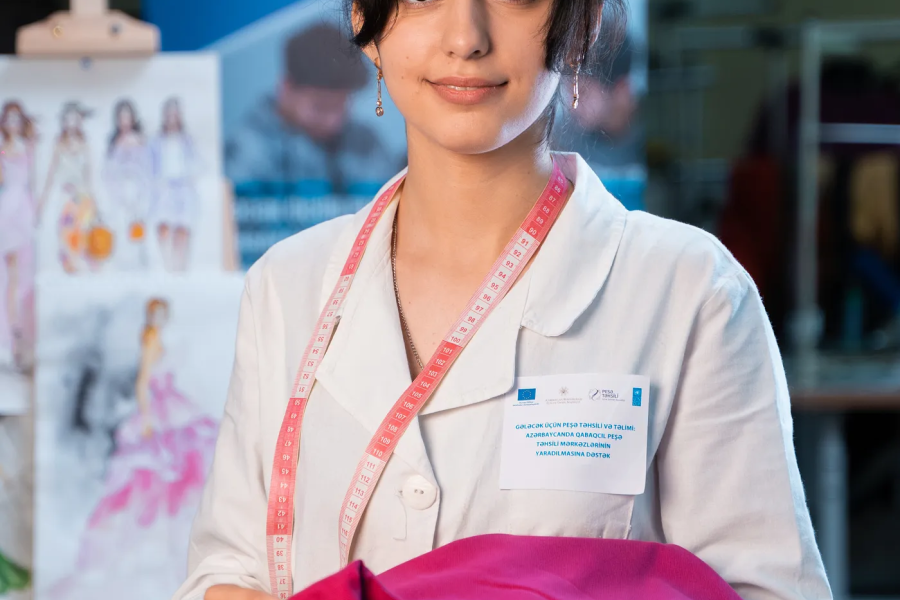
“VET for the Future” project works with the aim 1) to introduce innovations in vocational education institutions, 2) improve infrastructure in the VET providers, 3) strengthen networking in vocational education, and 4) improve the prestige and visibility of vocational education and training in Azerbaijan.
If you want to know further about the project or are about to choose your career, you can learn more on the vocational education opportunities using the hashtag #PeşəiləMümkündür (meaning: it’s possible with VET).


